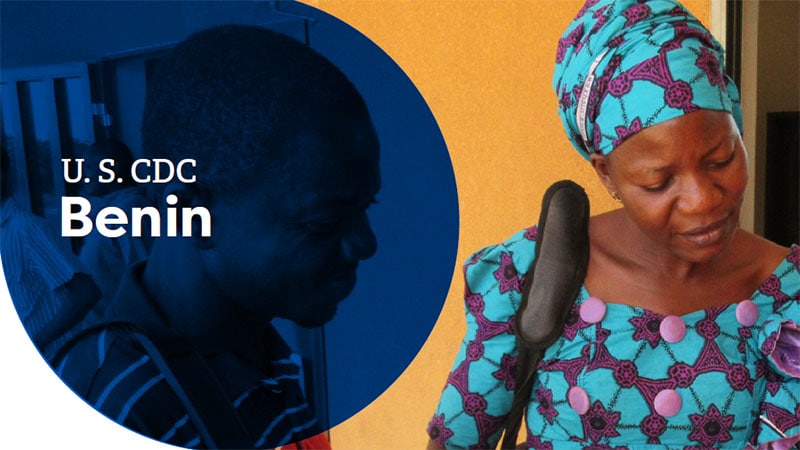At a glance
CDC works with the Ministry of Health and other partners to build effective public health collaboration and partnerships, which strengthen the country's core public health capabilities: data and surveillance, laboratory capacity, workforce and institutions, prevention and response, innovation and research, and policy, communications, and diplomacy.

Overview
CDC has been collaborating with the government of Benin since 1999. CDC Benin works closely with the Government of Benin and partner organizations to detect, prevent and control infectious disease outbreaks, and build and strengthen the country's core public health capabilities. These include data and surveillance, laboratory capacity, workforce and institutions, prevention and response, innovation and research, and policy, communications, and diplomacy. CDC's work aims to protect the health of our nations and public health around the world.
Global health security
Workforce development
Since 2016, CDC supports training scientists through the Field Epidemiology Training Program (FETP). This program strengthens Benin's workforce capacity to identify and stop outbreaks before they spread. The program consists of the Frontline level, and a new Intermediate level established in 2022. Through FETP trainees evaluate surveillance systems, analyze data for different diseases, and assess care and treatment for severe malaria cases among children under 5 years of age.
Key achievements
- CDC has trained over 99 public health staff disease detectives in the FETP Frontline course since the start of the program.
- In 2023, 15 participants from 12 administrative provinces completed the FETP Intermediate course.
Malaria
Malaria is endemic to Benin and is the leading cause of mortality among children under five years of age and of morbidity among adults.
CDC has collaborated with partners to support implementation of malaria prevention and control activities in Benin since 2008.
CDC-supported activities have included providing technical input in:
- Distribution of long-lasting insecticide-treated nets.
- Indoor residual spraying.
- Preventing malaria in pregnancy.
- Improving diagnostics and case management.
- Increasing access to rapid diagnostic tests, artemisinin-based combination therapies, and intermittent preventive treatment in public health facilities and private clinics.
Key achievements
Over the years, Benin has shown significant improvements in several key malaria indicators. More people own and use mosquito nets, and more pregnant women get treatment for malaria prevention. CDC has supported:
- Distribution of nearly 11 million mosquito nets since 2008.
- Delivery of more than 8 million doses of preventive treatment in pregnancy.
- Distribution of more than 20 million rapid diagnostics tests and nearly 20 million fast-acting malaria medicines.
Tuberculosis research
Through the Tuberculosis Trials Consortium, CDC works with the National Referral University Hospital to conduct clinical trials to assesses the efficacy and safety of several drug-sensitive tuberculosis regimens.
Measles and rubella
CDC serves as a Global Specialized Laboratory in the WHO Measles and Rubella Laboratory Network. CDC provides reagents and supplies through the International Reagent Resource (IRR), training and reference testing.

